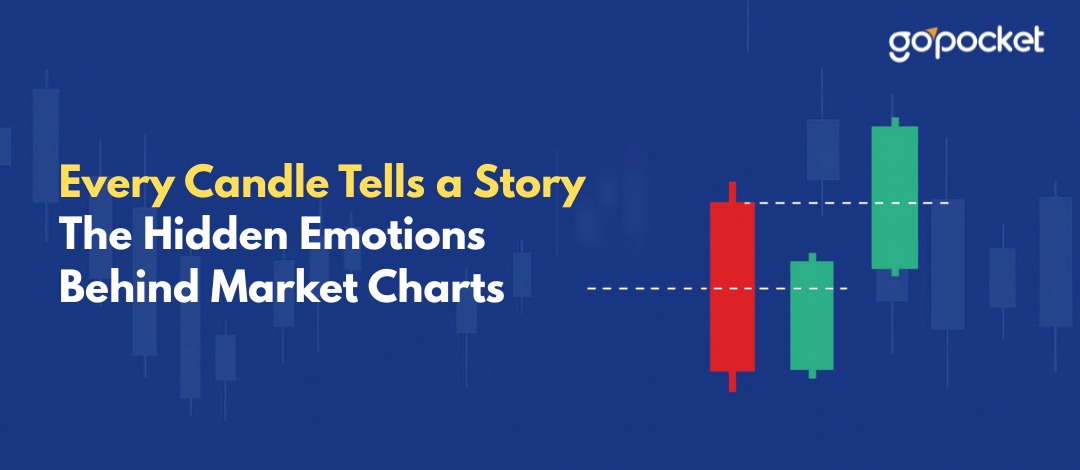
Ever stared at a trading chart long enough that the red and green started to feel alive?
Every flicker, every wick – they whisper something. A rush of hope, a wave of fear, a crowd cheering for one more breakout. But here’s the truth: only a few traders ever learn to read what those candles are really saying.
Because candlesticks don’t show numbers.
They show emotions They show emotions and deep candlestick trading psychology..
1. THE MARKET HAS A PULSE – AND CANDLES ARE ITS HEARTBEATS
Each candle you see on the screen is a heartbeat of the market. It tells you who’s winning the tug-of-war – the buyers or the sellers.
The open shows where the match began,
the high shows how bold the bulls became,
the low shows how far the bears pushed back
and the close reveals who had the final word.
If you zoom out, the chart looks like chaos. But if you learn to listen and understand how to read candles, it’s poetry – written in red and green. Traders who master this art don’t “predict.” They observe – developing a calm trader mindset that separates emotion from action.
2. EVERY CANDLE HAS A MOOD
A green candle isn’t just a profit – it’s confidence.
A red one isn’t loss – it’s hesitation.
And a Doji, that small cross-shaped candle? That’s confusion – when both sides fought hard, but no one won.
It’s almost cinematic.
The Hammer shows resilience after a fall.
The Shooting Star marks arrogance right before a drop.
The Engulfing pattern tells the story of sudden reversal – a comeback nobody saw coming.
Each pattern is like a scene in a movie, a reflection of market behavior analysis and trading emotions explained through price movement. And when you learn to read them, you stop reacting and start understanding.
3. THE MISTAKE MOST TRADERS MAKE: REACTING WITHOUT READING
Many traders stare at a screen full of candles – but see only colours.
A green candle excites them, a red one scares them.
That’s not trading. That’s emotional ping-pong.
The real traders – the calm ones – don’t jump in after a breakout.
They wait for the story to finish the sentence.
They ask, “Is this move genuine or just noise?”
Because markets have a habit: they test patience before rewarding it.
Every fake breakout, every sudden dip – it’s the market’s way of asking,
“Are you reacting, or are you reading?”
That’s the essence of understanding price action and mastering emotional control in trading.
4. BEHIND EVERY CANDLE IS A CROWD
Here’s something most beginners miss – candlesticks are not about you.
They represent the psychology of millions of people trading at that same moment.
When a long red candle appears, it’s not “the market falling.”
It’s fear spreading through screens across the world.
When a bullish engulfing forms, it’s not “a pattern.”
It’s confidence – traders regaining courage to buy again.
That’s why good traders respect candles. They don’t just read charts; they read crowds.
They sense when the masses are overreacting… and they quietly take the opposite side.
This awareness is what separates those who truly grasp candlestick trading psychology from those who trade on impulse.
5. THE ART OF WAITING BETWEEN CANDLES
The best traders aren’t fast. They’re patient.
They watch one candle close before acting on the next.
Because one candle is emotion.
Two candles are reacting.
But a series of candles? That’s confirmation.
They don’t fight volatility; they flow with rhythm.
They know that silence between candles is when real insight forms.
So next time the market moves too fast, do nothing for a moment.
Zoom out. Watch the story unfold.
You’ll realise – the market isn’t your enemy. It’s your mirror.And this patience is one of the most powerful beginner trading insights every trader must develop.
6. READING CANDLES IS READING YOURSELF
Here’s the twist – you’re not just reading market psychology; you’re reading your own.
That red candle that makes your heart race?
That green one that tempts you to buy late?
Those emotions live inside you, not inside the market.
A true trader doesn’t silence emotions – they understand them.
Because the day you control your reaction to a candle…
It's the day you stop being a follower of charts and start being a reader of stories.
This is where trading emotions explained becomes real – when you realize the chart is a mirror reflecting your decisions and mindset.
7. FROM CHAOS TO CLARITY
In the beginning, charts look messy.
You’ll see wicks, gaps, and colours that make no sense.
But over time, you’ll notice something magical – repetition.
Markets repeat human behaviour. Fear, greed, doubt, hope – they loop like seasons.
And that’s when the screen stops being random and starts becoming familiar.
The market’s chaos turns into clarity – one candle at a time.
You stop chasing. You start choosing.That’s the beauty of understanding price action and recognizing patterns that repeat across time.
8. THE STORY YOU’RE WRITING
Every time you trade, you’re adding your own candle to the market’s chart.
Your confidence, your mistakes, your patience – they all leave traces.
So, ask yourself:
Are you trading just for numbers, or are you learning the language of emotion?
Because once you start reading candles, you stop guessing and start feeling the market’s pulse.
That’s when trading becomes art.
And art, unlike noise, leaves a legacy.
FINAL THOUGHT
Every candle tells a story – of fear and recovery, of risk and reward.
But the most beautiful story is the one where you evolve with every candle you read.
At GoPocket, we believe trading is not about racing ahead – it’s about reading better.
So slow down, observe, and let the market speak.
Because once you start understanding the stories behind those colours,
You’ll realise – the market was never complicated.
It was always human.
For more insights like these, explore the GoPocket trading blog, where we break down candlestick trading psychology, market behavior analysis, and beginner trading insights to help you build a stronger trader mindset.
"Investments in securities market are subject to market risks. Read all the related documents carefully before investing."
What's Trending
Recent Blog
Open Your Demat Account in Under 5 Minutes
Have any queries? Get support
Blog
Recent Blogs

Open your GoPocket Account within 5 minutes.
Have any queries?






.jpeg)
.jpeg)


.jpeg)
.jpeg)



